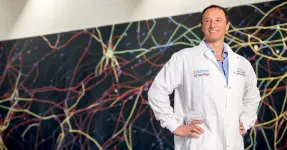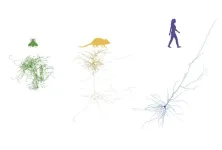(Press-News.org) As of 2024, 24 states including Virginia and Maryland, and DC have legalized the adult recreational use of cannabis. As laws change, citizens' perceptions of the drug and reasons for using the drug have also shifted. In 2020, 34.5% of adults aged 18-25 reported using cannabis in the previous 12 months, according to the Substance Abuse and Mental Health Services Administration. Health experts seek to better understand the broader implications of legalizations and individuals’ motivations and attitudes related to cannabis use.
New qualitative research by Iulia Fratila, assistant professor in George Mason University’s College of Public Health, and Liza Berdychevsky, associate professor at the University of Illinois Urbana-Champaign, describes in what ways young adults (aged 18-30) view cannabis as a recreational and leisure pursuit.
“Recreational cannabis legalization and liberalization is shifting across U.S. states. More holistic approaches to understanding perceptions of cannabis benefits and leisure motivations are scarce due to the longstanding criminalization of cannabis,” said Fratila, the principal investigator. “This research provides novel insights into cannabis users' leisure motivations of use and perceived benefits, which can be leveraged strategically in public health and drug education efforts in the societal transition from criminalization to normalization and commercialization trends concerning cannabis.”
Participants in Fratila and Berdychevsky’s study suggest cannabis can offer a leisure state of mind (e.g., experiencing flow, relaxation, and meditative state) as well as represent a leisure pursuit reserved for free time (e.g., using cannabis as a reward for free, post-obligations time outside of daily demands). Additionally, participants described how cannabis serves as a leisure activity itself (i.e., the act of getting high) and/or as an activity that accompanies other leisure pursuits and socialization (e.g., getting high and going to the movies), while providing pleasurable outcomes (e.g., feeling enjoyment, engaging in humor, enhancing senses).
“Participants discussed the ways that their recreational cannabis consumption represents a controlled and calculated risk-benefit leisure choice that is successfully managed for their overall well-being. Their narratives highlight that this perceived leisure pursuit does not necessarily interfere with their otherwise productive lives,” said Fratila.
These insights can inform harm reduction approaches to cannabis education that may be more effective considering the cannabis legalization and liberalization landscape. Health educators and health promoters can discuss cannabis risks and potential negative health outcomes while acknowledging the desired benefits cannabis users anticipate.
Fratila warns about the impacts of widespread legalization and the emerging recreational cannabis markets, which highlights another meaningful implication connected to the study findings. “Under prohibitory regulations, recreational cannabis use has been explicitly framed as deviant, criminal, harmful, life-wrecking, and void of any potentially desirable leisure qualities (e.g., pleasure, socialization). This study showcases the cannabis users’ understanding of cannabis as normative recreation and the anticipated leisure benefits,” said Fratila.
She further explained, “However, this is a cautionary tale because these desirable qualities may be easily exploited. More specifically, society may be facing a new conundrum with the commercialization of recreational cannabis as the switch from criminalization to commercialization overly simplifies and glamorizes the leisure meanings of cannabis for profitable gain.”
Public health experts and scholars will need to be at the front lines, in collaboration with other fields, to monitor how cannabis is repositioned and accommodated in a cannabis-friendly society, according to Fratila. Specifically, it will be important to spearhead effective health promotion efforts that minimize any related harms and maximize well-being.
This was a qualitative research project utilizing hermeneutic phenomenology, a research method to study how experiences affect everyday practices, and in-depth interviewing with 16 individuals (ages 18-30) living in the U.S. states with legalized recreational cannabis.
“Phenomenological Exploration of Young Adults’ Recreational Cannabis Use Experiences and Associated Leisure Meanings” was published in the Journal of Leisure Research in June 2024. This research was not funded.
END
New research describes the leisure motivations that underpin young U.S. adults' recreational cannabis use
Research from the George Mason University’s College of Public Health provides novel insights into attitudes and motivations among cannabis users aged 18-30
2024-06-10
ELSE PRESS RELEASES FROM THIS DATE:
UC San Diego develops first-in-kind protocol for creating ‘wired miniature brains’
2024-06-10
Researchers worldwide can now create highly realistic brain cortical organoids — essentially miniature artificial brains with functioning neural networks — thanks to a proprietary protocol released this month by researchers at the University of California San Diego.
The new technique, published in Nature Protocols, paves the way for scientists to perform more advanced research regarding autism, schizophrenia and other neurological disorders in which the brain’s structure is usually typical, but electrical activity is altered. That’s according to Alysson Muotri, Ph.D., corresponding author and ...
Lone Star State: Tracking a low-mass star as it speeds across the Milky Way
2024-06-10
It may seem like the Sun is stationary while the planets in its orbit are moving, but the Sun is actually orbiting around the Milky Way galaxy at an impressive rate of about 220 kilometers per second — almost half a million miles per hour. As fast as that may seem, when a faint red star was discovered crossing the sky at a noticeably quick pace, scientists took notice.
Thanks to the efforts of a citizen science project called Backyard Worlds: Planet 9 and a team of astronomers from around the country, a rare hypervelocity ...
Researchers demonstrate the first chip-based 3D printer
2024-06-10
CAMBRIDGE, MA – Imagine a portable 3D printer you could hold in the palm of your hand. The tiny device could enable a user to rapidly create customized, low-cost objects on the go, like a fastener to repair a wobbly bicycle wheel or a component for a critical medical operation.
Researchers from MIT and the University of Texas at Austin took a major step toward making this idea a reality by demonstrating the first chip-based 3D printer. Their proof-of-concept device consists of a single, millimeter-scale photonic ...
Making remanufacturing profitable
2024-06-10
Returning end-of-life products to as-new condition is called remanufacturing and can be an essential element in a circular economy. But for more industrial companies to take an interest in it, remanufacturing needs to be economically viable. In a doctoral thesis from Linköping University, Johan Vogt Duberg has investigated how this can be accomplished.
“It’s possible to take advantage of increased environmental awareness to gain economic benefits. With remanufacturing, the costs of raw materials can be reduced, new customer groups found and ...
NSF awards additional $9.8 Million for Delta, DeltaAI
2024-06-10
The National Center for Supercomputing Applications was recently awarded $4.9 million of supplemental funding from the U.S. National Science Foundation (NSF) for Delta and an additional $4.9 million for DeltaAI to expand the potential capabilities of the soon-to-launch system by nearly 50 percent.
NCSA originally received nearly $25 million from NSF in 2023 to deploy and operate DeltaAI, an advanced computing and data resource that will be a companion system to Delta. DeltaAI will triple NCSA’s AI-focused computing capacity and ...
Breakthrough in creating cyclic peptide opens the way for new antibiotics
2024-06-10
A discovery made by scientists at King’s College London could speed up efforts to produce new antibiotics in the fight against antimicrobial resistance.
In a paper published in the Journal of the American Chemical Society, scientists from the Department of Chemistry share a new, rapid method for making cyclic peptides – an important class of antibiotic molecules. The approach takes minutes rather than the hours or days it normally takes, helping overcome a major challenge in antibiotic development.
Lead author Dr Sarah Barry, from the Department of Chemistry at King’s College London, ...
Unregulated sales of a toxic and hallucinogenic mushroom endanger public health
2024-06-10
Americans’ interest in a potentially harmful “magic mushroom” is soaring, with Google searches skyrocketing 114 percent from 2022 to 2023, according to a new study by researchers at the University of California San Diego Herbert Wertheim School of Public Health and Human Longevity Science. In a paper published in the American Journal of Preventive Medicine, the scientists suggest that the growing market for Amanita muscaria may be sparked in part by emerging clinical research supporting the safety and efficacy of psilocybin as a treatment ...
Alarming trends call for action to define the future role of food in nation’s health
2024-06-10
CHICAGO, June 10, 2024 — The cost of nutritious food and the lack of access to it are of significant concern to U.S. consumers. That’s according to a new national poll of public attitudes on food and nutrition conducted by Zogby Analytics on behalf of Research!America and the American Heart Association. Nearly 7 in 10 (68%) respondents recognize healthy eating habits as an important factor in improving a person’s chance for a long and healthy life. Yet more than half (53%) say the United ...
Case studies show how quasi-governmental organizations could strengthen climate adaptation governance
2024-06-10
The politicization of climate issues and the unsynchronized efforts of stakeholders are hindering the effectiveness of climate adaptation governance in the U.S. According to a new study(Link is external) published by Princeton researchers, the design characteristics of quasi-governmental organizations (QGOs) could provide insights on how to depoliticize climate information sources and foster multi-level stakeholder coordination.
Quasi-governmental organizations are entities that have a combination of public and private characteristics, utilizing both for-profit and not-for-profit ...
Brain’s structure hangs in ‘a delicate balance’
2024-06-10
When a magnet is heated up, it reaches a critical point where it loses magnetization. Called “criticality,” this point of high complexity is reached when a physical object is transitioning smoothly from one phase into the next.
Now, a new Northwestern University study has discovered that the brain’s structural features reside in the vicinity of a similar critical point — either at or close to a structural phase transition. Surprisingly, these results are consistent across brains from humans, mice and fruit flies, which suggests the finding might be universal.
Although the researchers don’t ...
LAST 30 PRESS RELEASES:
New knowledge on heritability paves the way for better treatment of people with chronic inflammatory bowel disease
Under the Lens: Microbiologists Nicola Holden and Gil Domingue weigh in on the raw milk debate
Science reveals why you can’t resist a snack – even when you’re full
Kidney cancer study finds belzutifan plus pembrolizumab post-surgery helps patients at high risk for relapse stay cancer-free longer
Alkali cation effects in electrochemical carbon dioxide reduction
Test platforms for charging wireless cars now fit on a bench
$3 million NIH grant funds national study of Medicare Advantage’s benefit expansion into social supports
Amplified Sciences achieves CAP accreditation for cutting-edge diagnostic lab
Fred Hutch announces 12 recipients of the annual Harold M. Weintraub Graduate Student Award
Native forest litter helps rebuild soil life in post-mining landscapes
Mountain soils in arid regions may emit more greenhouse gas as climate shifts, new study finds
Pairing biochar with other soil amendments could unlock stronger gains in soil health
Why do we get a skip in our step when we’re happy? Thank dopamine
UC Irvine scientists uncover cellular mechanism behind muscle repair
Platform to map living brain noninvasively takes next big step
Stress-testing the Cascadia Subduction Zone reveals variability that could impact how earthquakes spread
We may be underestimating the true carbon cost of northern wildfires
Blood test predicts which bladder cancer patients may safely skip surgery
Kennesaw State's Vijay Anand honored as National Academy of Inventors Senior Member
Recovery from whaling reveals the role of age in Humpback reproduction
Can the canny tick help prevent disease like MS and cancer?
Newcomer children show lower rates of emergency department use for non‑urgent conditions, study finds
Cognitive and neuropsychiatric function in former American football players
From trash to climate tech: rubber gloves find new life as carbon capturers materials
A step towards needed treatments for hantaviruses in new molecular map
Boys are more motivated, while girls are more compassionate?
Study identifies opposing roles for IL6 and IL6R in long-term mortality
AI accurately spots medical disorder from privacy-conscious hand images
Transient Pauli blocking for broadband ultrafast optical switching
Political polarization can spur CO2 emissions, stymie climate action
[Press-News.org] New research describes the leisure motivations that underpin young U.S. adults' recreational cannabis useResearch from the George Mason University’s College of Public Health provides novel insights into attitudes and motivations among cannabis users aged 18-30


